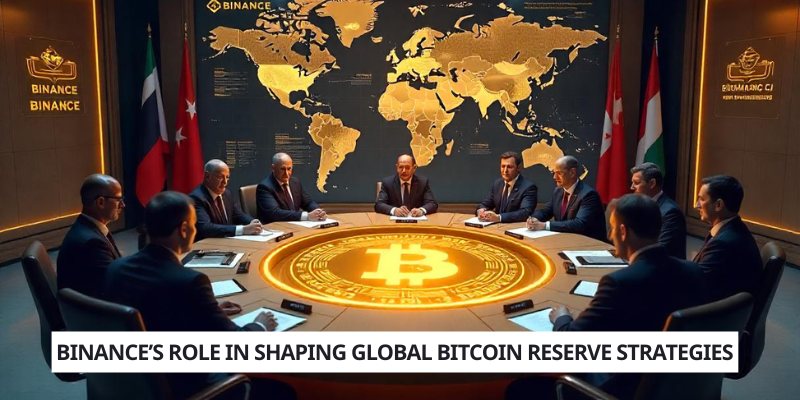The cryptocurrency landscape is witnessing a transformative shift as governments worldwide explore the integration of digital assets into their financial frameworks. A pivotal development in this arena is Binance’s active involvement in advising governments on establishing strategic Bitcoin reserves and crafting regulatory frameworks for cryptocurrencies.
The question of how Binance supports governments in Bitcoin reserve strategies has gained prominence, particularly as nations like the United States lead the charge in adopting Bitcoin as a national asset. This article delves into Binance’s advisory role, its strategic initiatives, and the broader implications for the global cryptocurrency ecosystem, drawing on insights from recent industry developments.
Binance’s Advisory Role in Bitcoin Reserves
Central to understanding how Binance supports governments in Bitcoin reserve strategies is its role as a consultant to multiple nations. Under the leadership of CEO Richard Teng, Binance has positioned itself as a trusted advisor, guiding governments in developing policies to accumulate Bitcoin as a strategic reserve asset. While specific countries remain undisclosed, Teng has highlighted the United States as a frontrunner in this movement, spurred by policies under President Donald Trump’s administration. These policies include an executive order to establish a national Bitcoin reserve, utilizing Bitcoin seized from criminal and civil forfeiture proceedings.

Binance’s expertise in cryptocurrency markets and blockchain technology enables it to offer tailored advice on building robust frameworks for digital asset reserves. This involves not only the accumulation of Bitcoin but also the creation of legal and regulatory structures to ensure compliance and security. By facilitating these discussions, Binance supports governments in Bitcoin reserve strategies, helping them navigate the complexities of integrating cryptocurrencies into national financial systems.
Strategic Context: The U.S. as a Trailblazer
The U.S. has emerged as a key player in the global push for Bitcoin reserves, providing a case study for how Binance supports governments in Bitcoin reserve strategies. The Trump administration’s pro-crypto stance, exemplified by the establishment of a national Bitcoin reserve, leverages approximately 200,000 BTC (valued at over $18 billion) currently held by U.S. authorities. This reserve, managed by the U.S. Department of the Treasury under Secretary Scott Bessent, is designed to serve as a long-term store of value, likened to a “Fort Knox” for digital gold.
Binance’s involvement in the U.S. extends beyond policy consultation. The exchange is collaborating with initiatives like World Liberty Financial, a decentralized finance (DeFi) project backed by the Trump family, which operates on Binance’s BNB Chain. This partnership underscores Binance’s strategic alignment with influential stakeholders, reinforcing its role in shaping how Binance supports governments in Bitcoin reserve strategies. Additionally, the U.S. Securities and Exchange Commission (SEC) has paused its investigation into Binance for 60 days, citing productive policy discussions, further highlighting Binance’s growing influence in regulatory circles.
Global Outreach and Regulatory Collaboration
Binance’s efforts to support governments in Bitcoin reserve strategies are not limited to the U.S. The exchange is actively engaging with countries such as Pakistan and Kyrgyzstan to develop cryptocurrency regulations and promote blockchain adoption. These collaborations focus on creating environments conducive to digital asset innovation while ensuring compliance with global financial standards. By advising on regulatory frameworks, Binance supports governments in Bitcoin reserve strategies by fostering trust and legitimacy in the cryptocurrency sector.
A significant aspect of Binance’s global strategy is its pursuit of a permanent global headquarters. Historically, under former CEO Changpeng Zhao (CZ), Binance resisted the concept of a fixed headquarters, viewing it as outdated. However, under Teng’s leadership, the exchange is reevaluating this stance, exploring options to establish a central base to enhance its credibility with regulators. This move is seen as a critical step in reinforcing how Binance supports governments in Bitcoin reserve strategies, as a formal headquarters could streamline regulatory compliance and strengthen partnerships with national authorities.

Binance’s Transformation and Compliance Focus
Binance’s ability to support governments in Bitcoin reserve strategies is underpinned by its ongoing transformation into a compliance-focused organization. Following a $4.3 billion fine in 2023 for violations of global financial regulations, Binance has made significant strides in rebuilding its reputation. Approximately 25% of its 6,000 employees now work in compliance and legal roles, reflecting a commitment to regulatory adherence. This shift has earned Binance higher regard from regulators, positioning it as a reliable partner for governments seeking to establish Bitcoin reserves.
The leadership transition from CZ to Richard Teng has been instrumental in this transformation. Teng’s emphasis on transparency and collaboration has facilitated productive engagements with regulatory bodies, as evidenced by the SEC’s temporary suspension of its Binance investigation. By prioritizing compliance, Binance supports governments in Bitcoin reserve strategies by offering a model of how cryptocurrency exchanges can align with national interests while advancing innovation.
Broader Implications for the Cryptocurrency Ecosystem
The question of how Binance supports governments in Bitcoin reserve strategies extends to its impact on the global cryptocurrency market. By advising governments, Binance is helping to legitimize Bitcoin as a strategic asset, potentially driving its adoption and value. Analysts predict that national Bitcoin reserves could propel Bitcoin’s price to new heights, with projections ranging from $187,500 to $1 million by the end of 2025, driven by limited supply and increased institutional demand.
Moreover, Binance’s collaborations signal a shift in the perception of cryptocurrencies, from speculative assets to integral components of national financial strategies. This trend is evident in the growing number of U.S. states, such as Texas and Oklahoma, proposing their own Bitcoin reserve laws, inspired by federal initiatives. Binance’s advisory role positions it at the forefront of this paradigm shift, shaping how Binance supports governments in Bitcoin reserve strategies on a global scale.
Challenges and Criticisms
Despite its progress, Binance faces challenges in its mission to support governments in Bitcoin reserve strategies. The exchange’s history of regulatory violations continues to cast a shadow, requiring ongoing efforts to rebuild trust. Critics argue that Binance’s involvement in national Bitcoin reserves could raise concerns about centralization and influence over sovereign financial policies. Additionally, the volatility of Bitcoin’s price, as seen in its decline following the U.S. reserve announcement, poses risks for governments adopting it as a reserve asset.
Skeptics, such as billionaire Mike Novogratz, have questioned the feasibility of large-scale Bitcoin reserves, citing potential conflicts within governments and the entrenched role of the U.S. dollar as the global reserve currency. These challenges highlight the complexities of how Binance supports governments in Bitcoin reserve strategies, requiring careful navigation of political, economic, and regulatory landscapes.
The Future of Binance’s Role
Looking ahead, Binance’s role in supporting governments in Bitcoin reserve strategies is poised to expand. The exchange’s commitment to establishing a global headquarters and its growing compliance infrastructure will likely enhance its credibility as a partner to governments. As more nations follow the U.S.’s lead in exploring Bitcoin reserves, Binance’s expertise in blockchain technology and market dynamics will be in high demand.
Furthermore, Binance’s involvement in projects like World Liberty Financial and its support for blockchain adoption in emerging markets position it as a catalyst for global cryptocurrency integration. By continuing to bridge the gap between governments and the crypto industry, Binance supports governments in Bitcoin reserve strategies, paving the way for a future where digital assets play a central role in global finance.

